Being socially active in 50s and 60s linked to lower risk of illness later in life, researchers say
Being socially active in your 50s and 60s may help lower the risk of developing dementia in later life, a study has found.
Researchers studied data that tracked more than 10,000 people from 1985 to 2013. The participants answered a questionnaire every five years about the frequency of their social contact with friends and relatives. They were also subject to cognitive testing, and electronic health records were searched for dementia diagnoses.
The results – published in the journal Plos Medicine – showed that seeing friends almost daily at age 60 was associated with a 12% lower likelihood of developing dementia in later life, compared with those who saw only one or two friends every few months. Seeing relatives, on the other hand, did not show the same beneficial association.
The authors suggest that practising using the brain for memory and language during social contact can build so-called cognitive reserve.
Tara Spires-Jones, a professor of neurodegeneration at the University of Edinburgh who was not involved in the work, explained: “Learning new things builds connections between brain cells, and so does social contact. The biology underlying this study is that the people who are socially active keep their brains better connected. If you have a better connected network in your brain, it can resist pathology for longer.”
Clive Ballard, a professor of age-related disorders at the University of Exeter, who was also not involved in the work, said: “There are plenty of other studies that have found that social isolation is a risk factor. The strength of this work is the large population studied, and that the assessment of social contact was done so long before the cognitive assessment bit. It makes the direction of causality much stronger.”
The authors note that the data did not include detail on the quality of social contact, and that dementia cases may have been missed if participants did not present to their GP.
There may also be overlapping factors at play: “It is known
that depression is a significant risk factor, and our work has shown
that hearing loss is [also] a significant risk factor. Both of those
might lead to social isolation. It’s likely to be a cluster of things
which are not totally independent,” said Ballard.Researchers studied data that tracked more than 10,000 people from 1985 to 2013. The participants answered a questionnaire every five years about the frequency of their social contact with friends and relatives. They were also subject to cognitive testing, and electronic health records were searched for dementia diagnoses.
The results – published in the journal Plos Medicine – showed that seeing friends almost daily at age 60 was associated with a 12% lower likelihood of developing dementia in later life, compared with those who saw only one or two friends every few months. Seeing relatives, on the other hand, did not show the same beneficial association.
The authors suggest that practising using the brain for memory and language during social contact can build so-called cognitive reserve.
Tara Spires-Jones, a professor of neurodegeneration at the University of Edinburgh who was not involved in the work, explained: “Learning new things builds connections between brain cells, and so does social contact. The biology underlying this study is that the people who are socially active keep their brains better connected. If you have a better connected network in your brain, it can resist pathology for longer.”
Clive Ballard, a professor of age-related disorders at the University of Exeter, who was also not involved in the work, said: “There are plenty of other studies that have found that social isolation is a risk factor. The strength of this work is the large population studied, and that the assessment of social contact was done so long before the cognitive assessment bit. It makes the direction of causality much stronger.”
The authors note that the data did not include detail on the quality of social contact, and that dementia cases may have been missed if participants did not present to their GP.
Similar benefits were seen for those who saw friends when they were aged 50 and 70, although the association was not strong enough to be statistically significant.
“This is due to the statistical uncertainty involved in the study,” said Dr Andrew Sommerlad of University College London, the lead author of the paper, “There’s no conceivable reason why it’d be important at 60 and not other age points.”
The work contributes to growing evidence that social activities could protect people from dementia in the long run, in addition to treating hearing loss, maintaining a healthy lifestyle and moving more.
Ballard said: “We now think that at least 35% of the risk for dementia is explainable by medical and lifestyle factors, which are potentially reversible. In the last 10 years there has been a slight reduction within each age band [of people] developing dementia because we’re beginning to pay more attention to those prevention factors.”
Sommerlad said: “The results of this study add another potential route by which people can take steps within their life to improve their brain health and reduce their risk of dementia.
“We need to be conscious that we’re in a society in which social isolation and loneliness is becoming more common. We hope that at a community level and policy level work will be done to make it easier for older people to stay connected.”
Case study: ‘It’s almost like a place of hope’
One movement that helps people socialise in middle age and beyond is the Men’s Sheds, which started in Australia in the late 1990s after its founders identified a lack of social and community opportunities for men. The sheds are primarily aimed at men over 50 but everyone is welcome.The Sunnyside Men’s Shed, one of 500 in the UK, sits in a quiet courtyard in Tower Hamlets, east London. Steve, 64, started coming to the shed after his wife died of cancer.

“I came here as a user from [mental health charity] Mind after some bereavement counselling after I stopped work,” he said. “I was quite depressed before my wife passed away, and when she finally died I went to a really dark place. I didn’t do anything for weeks and weeks, I was on antidepressants, and the doctor suggested I started doing something to take my mind out of it.”
“Coming here was good because I had no association with the past. I’d done a lot of antique restoration work, woodwork, contemporary stuff … because I’ve got all that knowledge it’s great to be able to share it.
“A lot of people have come here and they have been rewarded by coming here,” he added. “Because they may have had to give up work, they may have lost their sense of worth and self-confidence … they come in and repair something, or make something from new.
“They’ve discovered a new skill, and that might trigger something new in their life. Or they may just feel a bit like they’re part of something. It achieves practical things as well as the mental thing.”
“It’s very difficult for older people to make new friends who are going to be long-term friends. This is a place for that opportunity to keep on happening. It’s almost like a place of hope. It’s nice for people who’ve had a very shaky life, with mental health especially, to come to a place like this.”

No comments:
Post a Comment